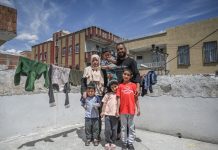Turkey’s pro-government media has been targeting five Dutch parliamentarians with a Turkish background, calling them traitors after the Tweede Kamer officially recognized the Armenian genocide, according to a report by nltimes.nl on Monday. The Turkish origin Dutch deputies have also been received threats via social media, two of them confirmed to RTL Nieuws. Tweede Kamer president Khadija Arib called this “unacceptable.”
Last week the Tweede Kamer, the lower house of Dutch Parliament, voted that the mass slaughter of thousands of Armenians during the reign of the Ottoman empire in 1915 should be recognized as a genocide. A large majority in the Kamer voted for this motion on Thursday, with only DENK, which is Turkish autocratic President Recep Tayyip Erdoğan’s proxy in Dutch Parliament, voting against.
According to report, on Saturday morning Turkish website En Son Haber opened the attack on five Dutch parliamentarians with a Turkish background: Dilan Yeşilgöz (VVD), Cem Laçin (SP), Sadet Karabulut (SP), Zihni Özdil (GroenLinks) and Nevin Özütok (GroenLinks). “The five Turks who have betrayed the motherland”, the website reads, along with photos of the parliamentarians. Other Turkish news sites also published similar reports, according to RTL.
Since then, the parliamentarians have been facing threats and abuse on social media. “I am constantly receiving reports of hate messages. There is a lot of scolding, I’m not going to translate that literally, there are also threats coming in,” SP parliamentarian Laçin said to the broadcaster.
GroenLinks parliamentarian Özdil confirmed the threats and said that “There are a lot of things coming in. The most creative verbal abuse, but also threats. I’m making screenshots of everything and I will report the most concrete threats.”
Neither of them will give in to this clear intimidation, they said. “I’m not going to keep my mouth shut. I’m a Dutch member of parliament and I’m proud of it. These reports are disgraceful, this is really demonization. The message is: You’re of Turkish origin, so you can not think this. That is very bad, to say the least”, Özdil said. Laçin added: “I find this a very bad thing. I was born and raised here. I’m simply a Dutch representative of the people.”
Kamer president Khadija Arib called this frontal attack on Dutch parliamentarians and their voting behavior completely unacceptable. “Parliamentarians are elected representatives of the people who must be free to express their opinion”, she said to Nieuwsuur. “Threatening or inciting threats in response to them expressing these opinions is unacceptable. It does not fit in a democracy and in an open and free society like ours.”
The Tweede Kamer recognizing the Armenian genocide has no effect on Dutch policy. The government will continue to refer to this mass murder as “the issue of the Armenian Genocide,” said Sigrid Kaag, the Minister of Foreign Affairs last week. The government will, however, send a representative to the commemoration of the genocide in the Armenian capital of Yerevan in April.
The relationship between the Netherlands and Turkey has been extremely tense since the Netherlands refused to let Turkish ministers enter the country to campaign for a referendum that gave President Erdoğan more power. Turkey accused the Netherlands of Nazism, fascism, and mass murder in Srebrenica, and imposed a number of sanctions against our country.
The Dutch government in turn did not congratulate Erdoğan when he won the referendum after a controversial voting. Talks between the two countries on restoring the relationship recently collapsed, and the Dutch government officially recalled the Dutch ambassador to Ankara.
Last week the Turkish Foreign Ministry also released a statement in response to the Kamer recognizing the Armenian genocide, here too referring to Srebrenica. The Ministry called the Kamer’s decision to recognize the Armenian genocide inappropriate for a country “that looked the other way during the genocide in Srebrenica.”















